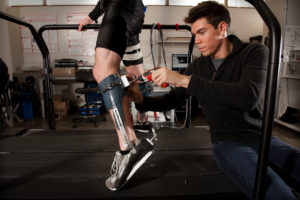Biomedical engineers are professionally trained to combine the rigors of medical and biological studies with the power of engineering analysis and design. Students choose biomedical engineering to be of service to others, to enjoy the excitement of understanding living systems, and to use state-of-the-art science and technology to solve the complex problems of medical care.
The emphasis in biomedical engineering is on finding solutions by researching, testing, and applying medical, biological, chemical, electrical, and materials information. Biomedical engineers are employed by hospitals, pharmaceutical companies, medical device and testing companies, government agencies, universities, and medical schools.
With so many areas of specialization within the field, graduates are encouraged to further their education by attending graduate or professional school. Graduates have obtained advanced degrees in not only biomedical engineering, but also related fields such as physical therapy, electrical engineering, mechanical engineering, public health, sports physiology, medical school, dental school, and pharmacy school.
Courses include:
Biomedical Engineering Design & Manufacturing, Human Physiology for Engineers, Biomechanics, Biomaterials, Biomedical Electronics, Senior Design
Once accepted into the program, students take engineering courses in mechanics, circuits and materials, followed by specialized courses in biomedical engineering.
Additional Information:
In’s and Out’s of Engineering CODA
Video-Engineering Majors Exploration
14 Grand Challenges for Engineering
| College | |
| Discipline |
|
| Academic Department |
|
| Departmental Contact | |
| Major Overview | |
| Plan Requirements | |
| Semester Sequence | |
| Related Majors | |
| Skills You Could Develop |
|
| Learn More About This Major | |
| Career Titles | |
| Learn More About Careers |
